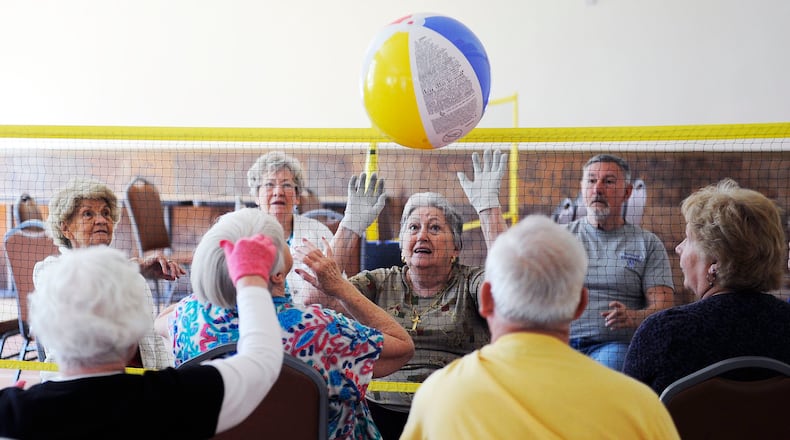“A straight renewal levy will not meet the growing needs of the population,” said Ken Wilson, vice president of program operations at the Council on Aging of Southwestern Ohio. “It would continue to generate $10.9 million a year and that would require a dramatic restructuring of the program and (create) a really big gap in need within the county that we would not be able to serve.”
Council on Aging of Southwestern Ohio manages the elderly services levy that provides programming so seniors can stay at home as long as possible. The agency served 4,079 clients last year. It pays for services such as transportation, meals, mental health, adult day services, housekeeping and repairs.
Stacy Hillman and her family brought her 82-year-old mother, Elsa, into their West Chester Twp. home after her dad died, and they utilize the caregiver service. The caregiver prepares her mom’s meals and does other chores while Hillman and her husband are at work. The agency also helped fund grab bars and other safety features installed before her mom moved in.
“We’re going to be in a whole mess of trouble if we don’t get the levy passed,” Hillman said of her own situation and asked her fellow voters to continue their support of these crucial services. The last levy request passed by 78%.
“We’re going to be in a whole mess of trouble if we don’t get the levy passed,” Hillman said of her own situation and asked her fellow voters to continue their support of these crucial services. The last levy request passed by 78%.
She said she is trying to keep her mom out of a nursing home and utilizing the services provided by the Council on Aging is “the only way to do it.”
Wilson told the Journal-News the cost differential between someone being able to stay independent or go into a nursing home is $450 a month versus $8,000. Council on Aging administrators said the need for elderly supportive services has risen exponentially since the last levy increase two decades ago. The number of residents age 60-plus has grown 79% and keeps multiplying rapidly.
The elderly services levy in place now expires at the end of this year and “if it didn’t pass, the funding would be gone next year and 4,000 older adults would lose services,” Wilson said.
Suzanne Burke, Council on Aging of Southwestern Ohio president and CEO, said the senior population continues to grow but their income has stayed even. Federal funding “has decreased significantly in 2025,″ and the future of that revenue stream is “fairly uncertain.”
Burke said they have deployed a number of cost-saving measures. In 2024, they instituted a “managed enrollment” policy restricting eligible program participants. Previously residents age 60-plus who needed help with day-to-day activities and couldn’t receive services elsewhere were eligible for services, but she said they needed to “tighten that up.”
Another cost-saving measure has been helping people utilize other resources because the senior levy is “the payer of last resort.”
“Over the past several years many Medicare Advantage plans have begun offering certain services for individuals on their plans,” she said. “We have been evaluating those plans and enrolling eligible clients for services such as transportation and emergency response. That saved $120,000 for the levy in 2024.”
Now is not the ideal time for the CoA to be seeking more financial support, given that many taxpayers are still reeling from higher property taxes that were brought on by the average 37% value hike during the mandated triennial value update in 2023. But Wilson said he wants voters and taxpayers to know they did not receive a windfall from the value explosion.
“There is a disconnect with some people about their rising property values and understanding with this levy the amount of revenue that’s collected does not go up with rising property values,” he said.
“When people understand that in relation to the growing need and the fact that so many more people in Butler County are older adults and in need of assistance to stay at home, it’s kind of no-brainer of why people should support this.”
About the Author
